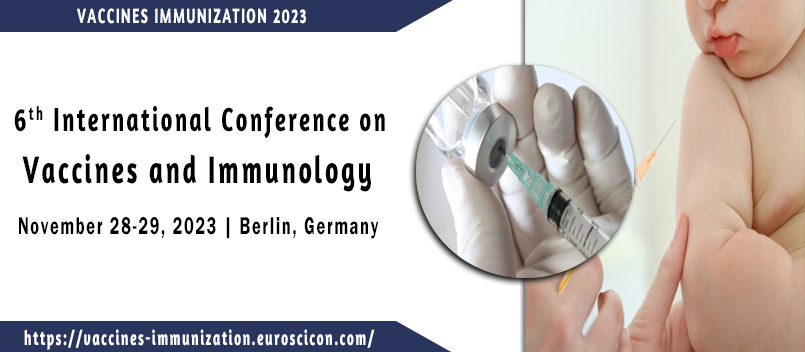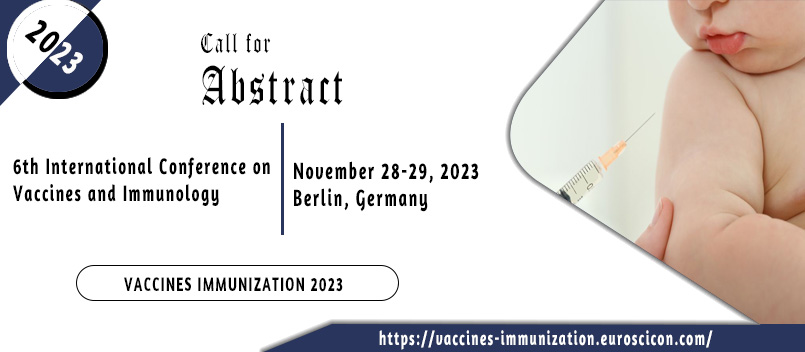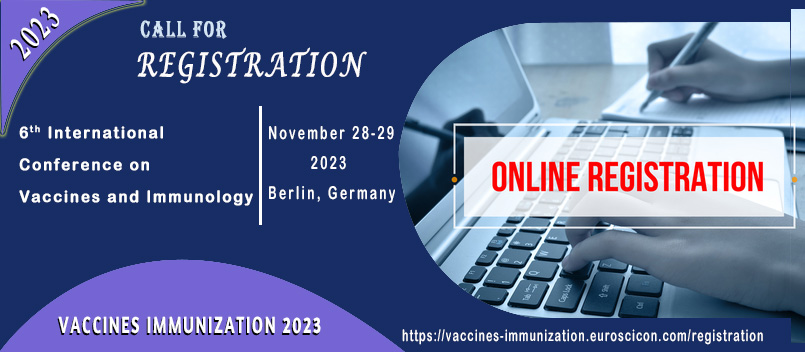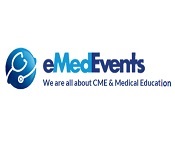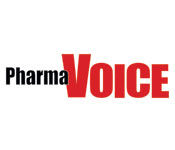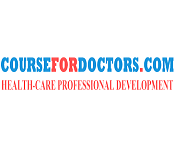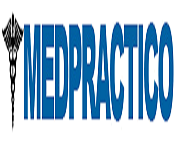Vaccines Immunization 2023
About Conference
Vaccines Committee cordially invites all the interested and enthusiastic participants across the globe to its prestigious " 6th International Conference on Vaccines and Immunology" to be held during November 28-29,2023 in Berlin, Germany which highlights the theme “Recent Advances in Vaccines Research and Development”.
The event will have Keynote speakers, Plenary speakers, Invited speakers, and fresh contributed speakers. Furthermore, a variety of poster presentations along with workshops and special sessions would be interested in listeners.
The aim of the Vaccines Immunization 2023 is to promote quality research and real-world impact in an atmosphere of true international cooperation between scientists and engineers by bringing together again the world-class researchers, International Communities and Industrial heads to discuss the latest developments and innovations in the fields of Vaccines.
We sincerely hope that Vaccines conferences serve as an international platform for meeting researchers from around the world, widen professional interaction, and create new opportunities, including establishing new alliances.
We look forward to seeing you at Vaccines Immunization 2023 in Berlin, Germany.
Why to attend???
Vaccines Immunization 2023 is aimed to give an opportunity that scholars from around the world focused on learning about Vaccines & Immunology and its advances; this is the best opportunity to reach the largest gathering of participants from the Vaccines & Immunology community. It provides an explicit platform for presentations that distributes information, meets with current and potential scientists. World-renowned speakers, the most recent techniques, developments, and the latest updates in Vaccines & Immunology are hallmarks of this conference.
Target Audience:
- Researchers & Scientists related to Vaccines R&D
- Deans and Professors
- CEO / CSO / COO
- CMO / Head of Scientific Affairs
- Head of Virology
- Head of Immunology
- University Faculty
- Medical Schools/Colleges
- Nursing Schools/Colleges
- Associations and Societies related to Vaccines R&D
- Vaccination Programme Organising Government and Non-government Organisations
- Business Entrepreneurs
- Medical devises Manufacturing Companies
- Vaccines Manufacturing Companies
- Vaccines Developers and Investigators
- Strategic Alliance
- Alliance/Partnership Development
- VP of Microbiology
Sessions/Tracks
Track 1: Emerging and Re-Emerging Infectious Diseases
Emerging diseases are those whose incidence in humans has increased in the past two decades, and re-emergence is the reappearance of a known disease after a significant decline in incidence.4 The magnitude of the problem is illustrated by the appearance of several new pathogens causing disease of marked severity, such as the human immunodeficiency virus (HIV) and other retroviruses, arenaviruses, Hantaviruses and the Ebola virus. Old pathogens such as cholera, plague, dengue hemorrhagic fever and yellow fever have re-emerged and are having considerable impact in the Americas.
Re-emerging, or resurging, diseases are those that have been around for decades or centuries, but have come back in a different form or a different location. Examples are West Nile virus in the Western hemisphere, monkey pox in the United States, and dengue rebounding in Brazil and other parts of South America and working its way into the Caribbean.
Track 2: Vaccine Research & Development
Vaccine Development is an activity that focuses on a variety of technological initiatives and applied research, which enhance and promote improved systems and practices for vaccine safety. In the past year, the unprecedented Ebola disease outbreak galvanized research and industry response and as we continue to search for solutions, we must review the lessons learned in order to overcome the current challenges. Vaccines development is a long, complex process, often lasting 10-15 years and involving a combination of public and private involvement. The current system for developing, testing, and regulating vaccines developed during the 20th century as the groups involved standardized their procedures and regulations.
- Basic Vaccinology
- Vaccines discovery, development & formulation
- Vaccine Management & Quality Assurance
- Vaccine Immunoinformatics
Track 3: Influenza and Respiratory Diseases
Population protection by vaccination against infections has been one of the major achievements of public health and is of considerable importance in controlling respiratory diseases.
- Vaccine against the Influenza Virus
- Vaccine against Pertussis
- Vaccine against Tuberculosis
- Vaccine against Streptococcus Pneumonia
Track 4: Vaccines Bioprocessing and Manufacturing
The vaccine industry, particularly, in major Western markets, continues to be dominated by a few major, long-established players that primarily manufacture aging, long-marketed, non-recombinant (nongenetically engineered) vaccines. The industry, however, will be changing in the coming years and this change may come rather rapidly.
Track 5: Vaccines Pre-Clinical Validation to Clinical Trials
Assess how to improve your clinical trial performance, from developing novel immunological assays to creating clinical efficacy.
Track 6: Anti-Microbial Resistance
Antimicrobial resistance (AMR) is one of the biggest threats to both human and animal health today. AMR can affect anyone, of any age, and in any country. It can lead to longer hospital stays, higher medical costs, and possibly death.
AMR occurs when germs that can cause infections, such as bad bacteria, become resistant to medicines, such as antibiotics, used to kill them.
There is a growing appreciation for the role of vaccines in confronting the problem of antimicrobial resistance. Vaccines can reduce the prevalence of resistance by reducing the need for antimicrobial use and can reduce its impact by reducing the total number of cases.
Role of Vaccines in Combating Antibioticâ€ÂResistant Bacteria
- Vaccines as part of antibiotic stewardship
- Prevent bacterial infections and avoid need for antibiotics
- Prevent use of antibiotics for viral infections
- Reduce transmission of antibioticâ€Âresistant strains
- Develop new vaccines to target resistant pathogens
- Assess regulatory pathways and clinical trial designs to facilitate vaccine development
- Understand vaccine markets and incentives to support R&D for new vaccines
Track 7: Vaccines Technology
Increasing and evolving demands for all types of products creates new challenges for vaccine manufacturers. As the market grows, innovative approaches to development and production will be needed to accelerate the delivery of novel products.
Health policy-makers are encouraging the use of new technology to meet these challenges and make vaccines more accessible.
- DNA delivery technologies
- Needle-free vaccine delivery
- Nanopatch Technologies
- Delivery systems for prophylactic and therapeutic vaccines
Track 8: Cancer and Immunotherapy
Immunotherapeutics is a treatment that uses your body's immune system to help fight cancer. Get information about the different types of immunotherapy and the types of cancer they are used to treat. The main types of immunotherapy now being used to treat cancer include:
- Cancer vaccines
- Monoclonal antibodies
- Immune checkpoint inhibitors
- Other, non-specific immunotherapies
Some types of immunotherapy are also sometimes called biologic therapy or biotherapy.
In the last few decades immunotherapy has become an important part of treating some types of cancer. Newer types of immune treatments are now being studied, and they’ll impact how we treat cancer in the future.
Immunotherapy includes treatments that work in different ways. Some boost the body’s immune system in a very general way. Others help train the immune system to attack cancer cells specifically. Immunotherapy works better for some types of cancer than for others. It’s used by itself for some of these cancers, but for others it seems to work better when used with other types of treatment.
- Feline Leukemia Vaccines
- Cancer Immunotherapy Biomarkers
- Non-specific cancer immunotherapies and adjuvants
- Oncolytic viral therapies
- Gene-therapy
- CAR T-Cell Therapy
Track 9: Vaccines Safety and Efficacy
Vaccines are the best defense we have against serious, preventable and sometimes deadly contagious diseases. Vaccines are some of the safest medical products available, but like any other medical product, there may be health risks. Accurate information about the value of vaccines as well as their possible side-effects helps people to make informed decisions about vaccination. The safety of vaccines is carefully monitored, starting early in the product development and continuing for as long as the vaccine is being used. Find out about what is done before and after vaccines are approved for use and what is known about the benefits and safety of specific vaccines. There is a lot of false information about vaccines safety on the Internet. This can be confusing. Discover the answers to common questions and concerns about vaccines.
- Vaccine Administration, Storage & Handling
- Factors Influencing Vaccine efficacy
- Vaccine safety communication
- Vaccine Safety Monitoring and Vaccine Pharmacovigilance
- Patient and Public acceptance and perceptions
- Post marketing surveillance of Vaccines
Track 10: Veterinary Vaccines
Veterinary vaccines are to improve the health and welfare of companion animals, cost-effectively increase the production of livestock, and prevent animal-to-human transmission from both domestic animals and wildlife. Several vaccine types can de be distinguished among the second-generation veterinary vaccines, depending on whether they are live or inactivated, according to the strain of rabies virus used and the characteristics of the cell-substrate chosen for viral replication. More recently a third generation of live veterinary rabies vaccine has been developed using recombinant technology. Depending upon the expression system these vaccines are used either parenterally or orally. Oral rabies vaccines are widely used in foxes in Europe and raccoons in the USA.
- Current status of Veterinary Vaccines
- Safety or efficacy of a Veterinary medicine
- Vaccines for Livestock Diseases
- Animal health outcomes
- Recent Advances in Animal Vaccination
Track 11: Hepatitis Vaccines
Viral hepatitis is a genuine medical issue everywhere throughout the world. Notwithstanding, the decrease of the bleakness and mortality because of immunizations against hepatitis A and hepatitis B has been a noteworthy segment in the general lessening in antibody preventable infections. We will examine the study of disease transmission, immunization advancement, and post-inoculation impacts of the hepatitis A and B infection. Furthermore, we examine endeavors to give the hepatitis D antibody to the 350 million people tainted with hepatitis B all around. Given the absence of a hepatitis C antibody, the numerous difficulties confronting the generation of a hepatitis C immunization will be appeared, alongside present and previous inoculation trials. As there is no present FDA-endorsed hepatitis E immunization, we will introduce inoculation information that is accessible in whatever is left of the world. At last, we will talk about the current difficulties and inquiries confronting future undertakings for every one of the hepatitis infections, with endeavors proceeding to center on significantly diminishing the dismalness and mortality related to these genuine contaminations of the liver.
- Hepatitis A
- Hepatitis B
- Hepatitis C
- Hepatitis D
Track 12: HIV/AIDS Vaccines
The long-term aim is to develop a non-toxic and effective vaccine that defends people worldwide after getting infected with HIV. However, even if a vaccine only defends some people who get vaccinated, or even if it affords less than total protection by reducing the threat of infection, it could still have a major impact on the rates of transmission and help control the pandemic, particularly for populations at high risk of HIV infection. A partially effective vaccine could decrease the number of people who get infected with HIV, further reducing the number of people who can pass the virus on to others. By considerably reducing the number of new-fangled infections, we can stop the widespread.
- HIV Vaccine Strategies
- T cell-based Vaccines
- B cell-based Vaccines
- Innate & Mucosal Immunity
- Viral Vaccine Vectors
Track 13: Preventable Disease Vaccines
An antibody preventable sickness is an irresistible malady for which a compelling preventive immunization exists. On the off chance that a man procures an immunization-preventable ailment and passes on from it, the demise is viewed as an antibody preventable passing.
- Diphtheria
- Haemophilus influenzae serotype b disease
- Meningitis
- Tuberculosis
- Yellow fever
- Mumps
- Measles
Track 14: Immuno-Pathology
The branch of medicine which deals with immune responses associated with disease is termed as Immunopathology. It includes the study of the pathology of an organism, organ system, or disease with respect to the immune system, immunity, and immune responses. According to biology, it refers to damage caused to an organism by its own immune response, as a result of an infection. It could be due to mismatch between pathogen and host species, and often occurs when an animal pathogen infects a human.
- Clinical Pathology
- Molecular Pathology
- Hematopathology
- Histopathology
- Dermatopathology
- Forensic Pathology
- Anatomical Pathology
- Oral & Maxillofacial Pathology
- Digital Pathology
Track 15: Microbiology
Microbiology is the study of biological organisms that are too small to be seen with the naked eye (without using such tools as the magnifying glass or microscope etc). It is therefore dedicated to studying the lives and characteristics of a wide variety of organisms ranging from bacteria and archaea to parasitic worms in their environments.
Microbiology has proved to be one of the most important disciplines in biology, making it possible to identify how some of these organisms cause diseases, discover cures for such diseases and even use some microbes for industrial purposes etc.
- Cellular Microbiology
- Molecular Microbiology
- Bacteriology
- Parasitology
- Medical Microbiology
- Microbial biotechnology
- Pharmaceutical Microbiology
- Veterinary Microbiology
- Protozoology
- Phycology
- Mycology
- Nematology
- Microbial Cytology
- Microbial Physiology
- Microbial Ecology
- Microbial Genetics
Track 16: Clinical Immunology - Current & Future Research
Immunology is the branch of the medical and biological sciences which focused on the study of the immune system. Protection from infection through various lines of defense is done by Immune System. Changes in the functionality of the Immune system can result in disease, such as autoimmunity, allergy and cancer. The development of many common disorders not traditionally viewed as immunologic, including metabolic, cardiovascular and neurodegenerative conditions such as Alzheimer’s are contributed by Immune responses.
- Viral Immunology
- Tumor Immunology
- Cancer Immunology
- Transplantation Immunology
- Ocular Immunology
- Parasite Immunology
- Neuroendocrine Immunology
- Psychoneuro-immunology
- Clinical & Diagnostic Immunology
Track 17: Inflammation and Therapies
Vaccines are potentially beneficial on one hand but causes long term effects on other hand. Extensive use impairs the natural immune system and prone to inflammatory diseases due to the vaccines effect on androgenic immune system. Some of the inflammation requires medications and some self-heal but there are some diseases which cannot fight by body which happens to be metabolic syndrome which are associated with vaccines. Bystander activation and Molecular mimicry and are the possible ways for the vaccines to trigger the auto immune disorders. The therapies have come a long way but need to work depending upon the root cause of all this disease.
Track 18: Antibodies: Engineering & Therapeutics
The engineered antibodies development led a path for the establishment of novel drug therapeutics. These have certain characteristics in penetrating the complex paths, promotes immune protection, Greater binding strength specifically chosen for the targets, Antibody applications used in various fields includes immunology, biotechnology and therapeutics which shows promising results.
Track 19: Immuno-Toxicology
The study of toxicity affecting the immune system is known as Immuno-Toxicology, toxin-induced immune dysfunction may take the form of immunosuppression, allergy, autoimmunity, increased vulnerability to cancer, or any number of inflammatory-based diseases or pathologies.
Agents that cause Immune toxicity are classified as:-
- Allergy-type: heavy metals, acid anhydrides, penicillin, and propylthiouracil.
- Direct immune toxicity: dexamethasone, cyclosporin A, azathioprine, heavy metals, and air pollution.
- Indirect Immune toxicity: p, p'-DDE.
Track 20: Epidemiology and Parasitology
Epidemiology is a Medical Speciality which deals with the incidence, distribution, and possible control of diseases and other factors relating to health.
(or)
Epidemiology is the study of how often diseases occur in different groups of people and why. Epidemiological information is used to plan and evaluate strategies to prevent illness and as a guide to the management of patients in whom disease has already developed.
Parasitology is a branch of science that is concerned with parasites and parasitism. Parasitism is A form of symbiosis in which one organism (called parasite) benefits at the expense of another organism usually of different species (called host). The association may also lead to the injury of the host. An example of parasitism is the association between the parasitic tapeworms and the vertebrate hosts.
- Parasitology has different sub-disciplines:
- Medical parasitology:- which deals with the human parasites and the diseases caused by them
- Veterinary parasitology:- which deals with animal parasites
- Structural parasitology:- which studies the structures of proteins from parasites
- Quantitative parasitology:- which is the quantitative study of parasitism in a host population
- Parasite ecology:- which studies the ecological impact of parasites
Track 21: Vaccination Advancement and Immunization
Basically three kinds of vaccination methods are used to provide vaccines like pulse vaccination strategy, ring vaccination and cocooning. Immunization could be a tried tool for dominant and eliminating life-threatening infectious diseases and is calculable to avert between two and three million deaths every year. It's one among the foremost efficient health investments, with tried methods. It's clearly defined target groups; it is often delivered effectively through reach activities.
Track 22: Immuno-Genetics & Immune Tolerance
The branch of medical genetics that explores or Studies the relationship between the immune system and genetics is known as Immunogenetics. Autoimmune diseases, such as type 1 diabetes, are complex genetic traits which results due to the defects in the immune system. Identification of genes defining the immune defects will identify new target genes for therapeutic approaches. Genetic variations also helps to define the immunological pathway leading to disease.
Immune tolerance can be defined as the state of unresponsiveness of the immune system to substances or tissue that has the capacity to elicit an immune response in given organism. Immune tolerance is important for normal physiology. It can be induced by prior exposure to that specific antigen and contrasts with conventional immune-mediated elimination of foreign antigens.
Tolerance is classified depending on where the state is originally induced in the thymus and bone marrow or in other tissues and lymph nodes.
- Central tolerance: Immune system learns to discriminate self from non-self.
- Peripheral tolerance: Preventing over-reactivity of the immune system to various environmental entities such as allergens, gut microbes, etc.
Track 23: Stem Cell Therapy
The use of stem cells to treat or prevent a disease or condition is known as Stem-cell therapy and it is the widely used for Bone marrow transplantation, but some therapies are derived from umbilical cord blood are also in use. Research is underway in-order to develop various sources for stem cells, as well as to apply stem-cell treatments for Neuro-degenerative diseases and conditions such as diabetes and heart disease.
Track 24: Internal Medicine
The branch and specialty of medicine concerning the diagnosis and nonsurgical treatment of diseases in adults, especially of internal organs is known as Internal Medicine.
Doctors of internal medicine are also called "internists" are required to have included in their medical schooling and postgraduate training at least three years dedicated to learning how to prevent, diagnose, and treat diseases that affect adults.
Sub-Specialities under Internal Medicine:
- Cardiology: deals with disorders of the heart and blood vessels
- Endocrinology: deals with disorders of the endocrine system and its specific secretions called hormones
- Gastroenterology: deals with the field of digestive diseases
- Hematology: deals with blood, the blood-forming organs and its disorders
- Infectious disease: deals with disease caused by a biological agent such as by a virus, bacterium or parasite
- Medical oncology: deals with the study and treatment of cancer
- Nephrology: deals with the function and diseases of the kidney
- Pulmonology: deals with diseases of the lungs and the respiratory tract
- Rheumatology: deals with the medical diagnosis and therapy of rheumatic diseases.
Track 25: Emergency Medicine
The medical specialty concerned with the care of illnesses or injuries which requires immediate medical attention is known as Emergency Medicine. Emergency physicians care for unexpected and undifferentiated patients of all ages. The primary responsibility is to initiate resuscitation and stabilization and to start investigations and interventions to diagnose and treat illnesses in the acute phase.
In general, Emergency physicians practice in hospital emergency departs, pre-hospital settings such as emergency medical services and intensive care units, but they also work in primary care settings such as urgent care clinics.
Sub-specializations of emergency medicine are:
- Disaster Medicine
- Medical Toxicology
- Ultrasonography
- Critical Care Medicine
- Hyperbaric Medicine
- Sports Medicine
- Palliative Care
- Aerospace Medicine
Track 26: Allergy & Asthma
Allergies or allergic diseases are caused by hypersensitivity of the immune system to typically harmless substances in the environment. Hay fever, food allergies, atopic dermatitis, allergic asthma, and anaphylaxis are few examples for diseases and red eyes, an itchy rash, sneezing, a runny nose, shortness of breath, or swelling are the symptoms. Food intolerances and food poisoning are different conditions.
The common long-term inflammatory disease of the airways of the lungs is known as Asthma and it is characterized by variable and recurring symptoms, reversible airflow obstruction, and easily triggered bronchospasms. Symptoms include episodes of wheezing, coughing, chest tightness, and shortness of breath.
Track 27: Novel Approaches & New Trends in Vaccines Development
Vaccine development remains challenging due to the highly sophisticated evasion mechanisms of pathogens for which vaccines are not yet available. Recent years have witnessed both successes and failures of novel vaccine design and the strength of iterative approaches is increasingly appreciated. These combine the discovery of novel antigens, adjuvants, and vectors in the preclinical stage with computational analyses of clinical data to accelerate vaccine design.
Track 28: Immune-disorders
Dysfunction of the immune system is termed as immune disorder. These disorders can be characterized in several different ways:
- By the component(s) of the immune system affected
- By whether the immune system is overactive or underactive
- By whether the condition is congenital or acquired
International Union of Immunological Societies has characterized that, there are more than 150 primary immunodeficiency diseases (PIDs). However, the number of acquired immune-deficiencies exceeds the number of PIDs and suggested that most people have at least one primary immunodeficiency, due to redundancies in the immune system.
Track 29: Immuno-Informatics
The study of molecules of the immune system by applying informatics techniques. This study aims the efficient and effective prediction of immunogenicity. This may be done at the level of epitopes, sub-unit vaccines, or weakened or inactive pathogens.
The ability of a pathogen or a part or molecule of a pathogen to induce a specific immune response when first exposed to surveillance by the immune system is known as Immunogenicity. The capacity for recognition by the adaptive immune response molecular machinery in a recall response is known as Antigenicity.
Track 30: Immune Regulation
Immune Regulation is known as regulatory adjustment of the immune system. It has natural and human-induced forms.
- Homeostasis in the immune system, whereby the system self-regulates to adjust immune responses to adaptive rather than maladaptive levels by using regulatory T cells, cell signalling molecules.
- In Human-Induced form, immune responses are induced, amplified and attenuated or prevented according to therapeutic goals.
Market Analysis
Vaccines Conferences advisory board invites all the participants across the world to attend “6th International Conference on Vaccines & Immunology” going to be held during November 28-29, 2023 in Berlin, Germany. The Theme of the conference is "Recent Advances in Vaccines Research and Development" will explore the advances in Vaccines and Immunology.
Importance & Scope:
This conference could be an exceptional event that brings along a novel and International mixture of huge and medium cognizance on Vaccines and Therapeutics, leading universities engendering the conference an ideal platform to apportion expertise, foster collaborations across trade and world, and assess elevating technologies across the world.
Vaccination is a key to eradicate the diseases. It is a subject for the professionals who looks beyond the clinical prospects. Traditional approaches to vaccine design were to emasculate or inactivate the human pathogen or a cognate animal homologue, Vaccinology is the science of vaccine development and how the immune system responds to vaccines, but additionally includes perpetual evaluation of immunization programs and vaccine safety and efficacy, as well as surveillance of the epidemiology of vaccine-preventable diseases. This chapter provides a brief overview of some of the main concepts of immunology and Vaccinology as they relate to immunization. Vaccines & Immunization 2023 amasses all the extroverts under one roof of current advances.
Market Growth of Vaccine Research in the last and upcoming ten years
The global vaccines market is one of the fastest-growing segments and new predictions estimate the value of the market to reach between $48 billion and more than $70 billion over the next five to eight years.
According to a new report released by Transparency Market Research, the value of the global human vaccines market is expected to grow from $28.3 billion in 2015 to $72.5 billion in 2024. The projection would represent a compound annual growth rate (CAGR) of 11.2% from 2016 to 2024. Even though the dollar figure is large and growing, vaccines still only account for 3% of the market share within the global pharmaceutical industry. The report broke down expectations by segments. By age group, paediatric vaccines accounted for 57.5% of the share in 2015, but adult vaccines are expected to grow at a 13.2% CAGR during the forecast period. When the research group analysed the market by product, they found the pneumococcal segment to have the majority share in 2015, but expect hepatitis products to demonstrate strong growth through 2024. By vaccine type, the conjugate vaccines held the majority share in 2015, but the combination vaccines were expected to have the largest CAGR.
Learn More
Top Immunology Universities Worldwide:
Immunology Universities in Europe
Medical University of Vienna, Vienna, Austria | Second University of Naples, Naples, Italy | University of Copenhagen, Hellerup, Denmark | Necker Children's Hospital, Paris, France | Paracelsus Private Medical University Salzburg, Austria | Medical University of Innsbruck, Austria | Krankenanstalt Rudolfstiftung, Wien, Austria | Bispebjerg University Hospital, Copenhagen, Denmark | University of Lille, France | Ludwig Maximilians University Munich, Germany | Charité-Universitätsmedizin Berlin, Germany | Wroclaw Medical University, Wroclaw, Poland | Finnish Institute of Occupational Health, Helsinki, Finland | Technical University Munich, Germany | University of Pisa, Italy | University of Messina, Messina, Italy | University Laboratory of Medical Research-University of Verona, Italy | Herlev and Gentofte Hospital, University of Copenhagen, Copenhagen, Denmark | Wageningen University, the Netherlands | University Medical Centre Utrecht, The Netherlands | University of Bologna, Bologna, Italy | Clermont-Ferrand, France | Imperial College London, London | Manchester Institute of Biotechnology | University Hospitals of Geneva and University of Geneva, Geneva, Switzerland | Zealand University Hospital, Denmark | Odense University Hospital, Denmark | Aarhus University, Denmark | Tampere University Hospital, Tampere, Finland | University of Tampere School of Medicine and Fimlab Laboratories, Tampere, Finland | Helsinki University Central Hospital, Helsinki, Finland | Pharmacie Clémenceau, France | University of Foggia, Italy | National Research Council (CNR), Avellino, Italy | Oslo University Hospital, Norway | Norwegian Institute of Public Health, Oslo, Norwa | University of Bonn, Bonn, Germany | University of Warmia and Mazury, Olsztyn, Poland | Montana State University, Bozeman, Montana
Immunology Universities in USA
University of Veracruz, Veracruz, México | Stanford University, Stanford, USA | Universidad Autonoma de Sinaloa, Mexico | University of California, Davi
